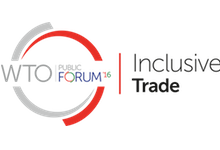New solutions to e-commerce regulatory barriers: The advent of secure transnational digital identities
28 Sep 2016 17:00h - 18:30h
Event report
[Read more session reports and live updates from the 2016 WTO Public Forum.]
This session, organised by the Permanent Mission of Estonia to the WTO, discussed transnational digital identity, pioneered by Estonian e-Residency, as an enabler for e-commerce giving entrepreneurs in developing countries equal footing to maximise their full e-commerce potential.
Alfredo Suescum, Ambassador and Permanent Representative of Panama to the WTO, moderated the panel and introduced the speakers, starting with Victoria Saue. Saue is Head of Risk and Compliance, e-Residency programme, Enterprise Estonia, and she explained the background of e-Identity and e-Residency in Estonia.
e-Identities have existed in Estonia for more than 15 years. They allow citizens to access a wide range of services online; from travelling to digital signatures and from healthcare to voting. Driven by the desire to open Estonia’s experience to other parts of the world, the country has established e-Residence: a secure digital identity for everybody in the world interested in running a location-independent business online. e-Residency is provided after an extensive background check and a visit to an Estonian embassy. Once issued with an e-Residence card, e-Residents are able to securely use all the digital services that Estonians have access to.
Marcos Vaena, Chief of Enterprise Competitiveness at the International Trade Centre, highlighted the importance of a digital enabling ecosystem that allows e-commerce to flourish. Often, this environment is lacking in developing countries, where small and medium enterprises need to overcome barriers when setting up and managing their businesses. The Estonian example teaches us what an enabling environment could look like. This vision can be expanded to other countries. Since trade is a relationship that is largely dependent on trust, digital identities can help provide this element.
Raul Rikk, Head of National Cyber Security Domain at the e-Governance Academy Foundation, presented the e-Governance Academy, a capacity-building institution for countries in providing e-governance, e-democracy, and national cybersecurity solutions. This cybersecurity element has been an integral part throughout the development of e-Identities, as they ensure who is on the other side of the computer. Rikk then showed how e-Identities have led to increased economic and governance efficiency. Yet he emphasised that there is a complex system behind the digital ID to ensure trust and security. Finally, he highlighted the need for mutual recognition of countries’ digital IDs.
Tudor Ulianovschi, Ambassador and Permanent Representative of the Republic of Moldova to the UN, provided a view from one of the countries assisted by Estonia in the e-governance transformation process. As a result of this transformation, Moldova’s government is becoming an increasingly transparent institution. Government and citizens are saving time and money, and e-governance is enhancing trust and appreciation for the government on the part of businesses and citizens.
Martin Rand, CEO and Co-Founder of VitalFields, provided an explanation of how e-Identities can help enterprises. His company operates an ‘online farm management platform’ in the form of an application that allows farmers to manage every aspect of farming through their mobile phones. The data created by the app have also allowed for extensive analyses and an automated advisory that could result in an average increase of €31 in profit per hectare.
After the speakers’ contributions, the topic was extensively discussed in the conference room. One participant asked about ways in which Estonia ensures that the electronic systems are not compromised by hackers. Pointing to the key importance of security for a trusted e-Identity, Rikk explained that the government uses the best cybersecurity solutions and that the systems have not been intruded upon in the last 15 years.
Other questions addressed issues of taxation for e-Resident, Moldova’s transition towards multistakeholder Internet governance, and the need to convince citizens to change to an entirely new digital culture. Saue and Rikk emphasised that this is indeed a long process, and that the start is always difficult. Yet, cooperation and support from the private and public sectors have proven to be instrumental, and once people understand how they can benefit from these services, they will adopt them automatically. As Rand explained, the ultimate solution might well be to get ‘more software developers to run for office’. Saue closed the panel by stating: ‘Digital society is the future, so let’s be part of it.’
by Barbara Rosen Jacobson
Related topics
Related event

